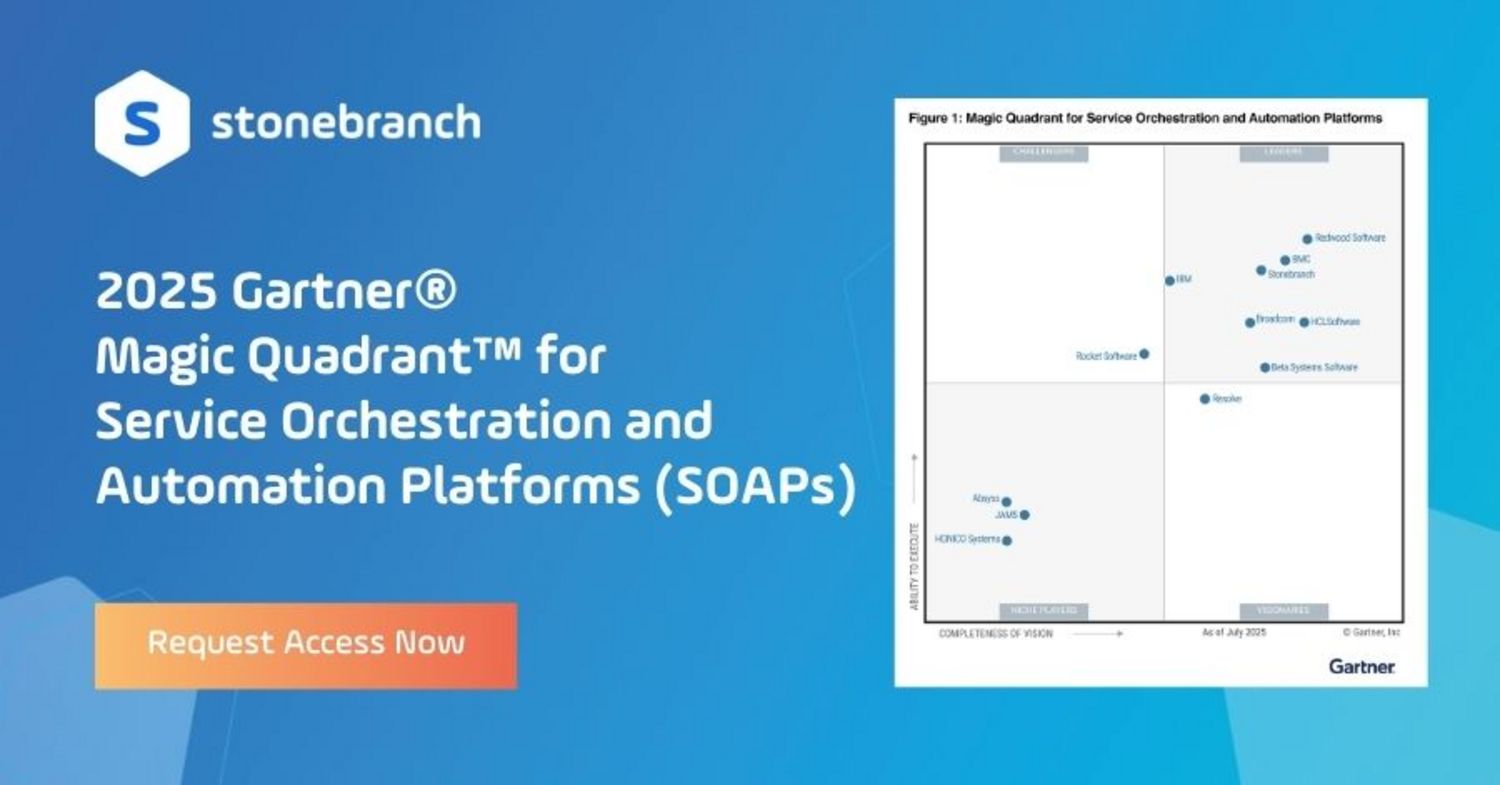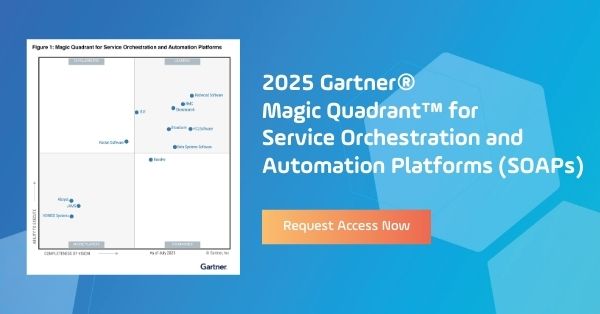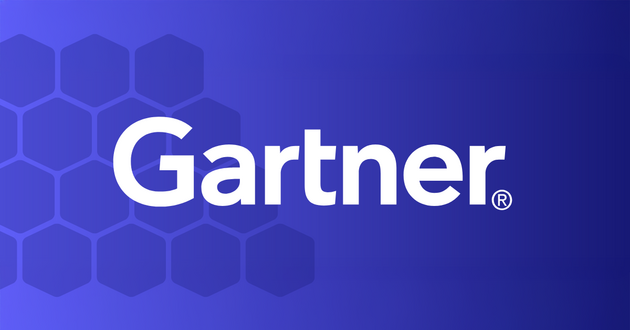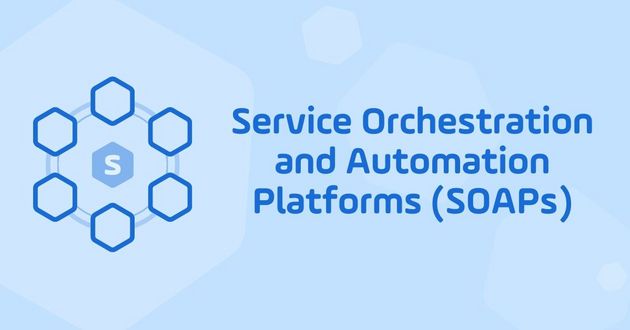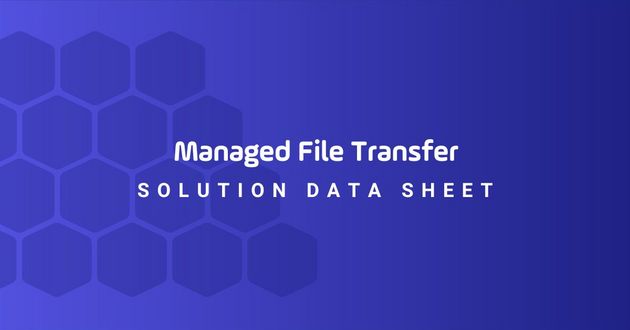SOAP Insights from the 2025 Gartner® Magic Quadrant™ Report
Understand the evolving SOAP market, the role of AI and cloud-native architectures, and why Stonebranch is named as a Leader.
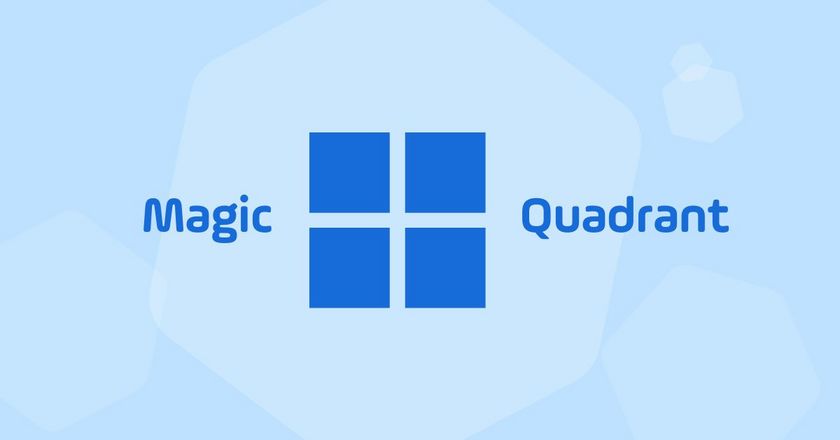
The latest SOAP Magic Quadrant has arrived! In August 2025, Gartner released the second Magic Quadrant for Service Orchestration and Automation Platforms (SOAPs) report.
A trusted resource for IT operations and automation professionals looking to understand the competitive landscape of technology solutions, the Gartner Magic Quadrant reports are a culmination of rigorous, fact-based research in specific markets.
In the report, Gartner says, “SOAPs empower infrastructure and operations (I&O) leaders to streamline and accelerate the delivery of business services. These platforms integrate workflow orchestration, workload automation and resource provisioning across an organization’s hybrid IT landscape. By automating and optimizing these processes, SOAPs enable organizations to rapidly deploy workloads, enhance operational efficiency and achieve significant cost savings while ensuring high availability and business continuity.”
Given the criticality of SOAP solutions, we'll deep dive into the report to break down the purpose of the Gartner Magic Quadrant, explore the growing SOAP market, and highlight why we believe Stonebranch is positioned as a Leader.
“These platforms integrate workflow orchestration, workload automation and resource provisioning across an organization’s hybrid IT landscape. By automating and optimizing these processes, SOAPs enable organizations to rapidly deploy workloads, enhance operational efficiency and achieve significant cost savings while ensuring high availability and business continuity.”
– Gartner
The Purpose of the Gartner Magic Quadrant
A Gartner Magic Quadrant is a culmination of research in a specific market, giving you a wide-angle view of the relative positions of the market’s competitors. This research enables you to get the most from market analysis in alignment with your unique business and technology needs.
The Gartner Magic Quadrant provides a graphical representation of the SOAP market’s direction, maturity, and providers. It evaluates vendors based on their Ability to Execute and Completeness of Vision:
- Ability to Execute reflects the Gartner assessment of the vendor’s product and/or service, overall viability, sales execution and pricing, market responsiveness and record, marketing execution, customer experience, as well as operations.
- Completeness of Vision comprises the Gartner view of the vendor’s overall market understanding, marketing strategy, sales strategy, offering (product) strategy, business model, vertical/industry strategy, innovation, and geographic strategy.
A Magic Quadrant provides a graphical competitive positioning of four types of technology providers, in markets where growth is high and provider differentiation is distinct: Leaders, Challengers, Visionaries, and Niche Players:
- Leaders execute well against their current vision and are well-positioned for tomorrow.
- Challengers execute well today or may dominate a large segment but don’t demonstrate an understanding of market direction.
- Visionaries understand where the market is going or have a vision for changing market rules but don’t yet execute well.
- Niche players focus comparatively successfully on a small segment, or are unfocused and don’t out-innovate or outperform others
The placement of vendors within these quadrants helps organizations quickly gauge which providers are recognized in the market and which are specialized in certain areas.
In our view, the quadrant’s purpose is to assist decision-makers in understanding which technology solutions are most aligned with their needs.
SOAP: The New Standard for IT Automation
The SOAP category represents a significant evolution from traditional workload automation (WLA).
We feel that the Gartner experts’ decision to retire the Magic Quadrant for WLA in 2013 paved the way for a broader focus on orchestration and automation. By creating the SOAP category in 2020, we believe Gartner acknowledged the need for automation platforms that extend beyond WLA to support cloud computing, data pipelines, and event-driven workflows.
As IT landscapes continue to grow more dynamic, service orchestration and automation platforms extend beyond basic task scheduling to support cloud-native infrastructure, data pipelines, and DevOps toolchains. SOAPs are typically implemented by IT operations teams who often also make the capabilities available to site reliability engineering (SRE), DevOps, DataOps, and I&O automation teams. In addition, SOAPs that provide self-service automation functionality also empower citizen automators throughout the business to reduce manual work and increase agility.
We think the Gartner report’s introduction of a SOAP-specific Magic Quadrant category in 2024 reflects the rising importance of these platforms. With hybrid infrastructure and multi-cloud environments becoming standard, organizations require orchestration solutions that can bridge the gap between legacy systems and new technologies.
Market Dynamics and Growth of the SOAP Market
The SOAP market once again experienced double-digit growth year-over-year, with revenue reaching $3.8 billion in 2024 — up from $3.3 billion in 2023. This market is expected to continue to increase to an estimated $4.9 billion by 2028 in constant currency, with a compound annual growth rate (CAGR) of 7.7%.
Key trends influencing the market include:
- Increased Adoption of AI and Machine Learning: By 2029, 75% of SOAP workflows will leverage generative AI (GenAI) to increase troubleshooting efficiency by 50%, up from less than 10% in 2025.
- Expansion of Use Cases: SOAP adoption is growing in DevOps, SRE, and data operations teams, with deeper integration into cloud-native and hybrid IT environments.
- Customer Expectations: Enterprises demand end-to-end orchestration, mission-critical reliability, and unified platforms that span legacy, data pipeline, and cloud-native systems.
Stonebranch: A Leader in the Gartner Magic Quadrant for SOAP
For the second consecutive year, Stonebranch is a Leader in the 2025 Gartner Magic Quadrant for SOAPs.
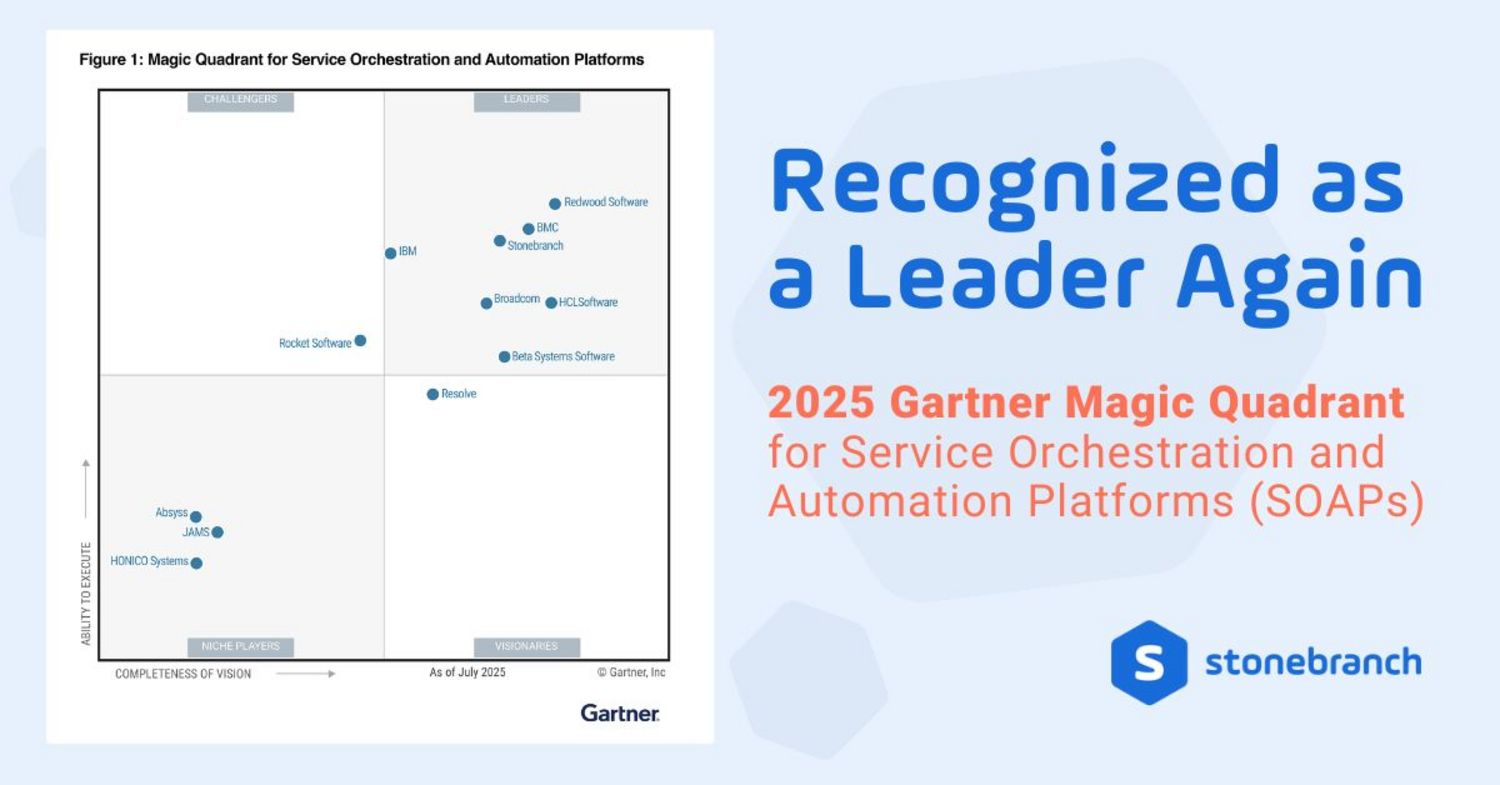
Positioned as a Leader, we think Stonebranch Universal Automation Center (UAC) is recognized for its comprehensive capabilities and strategic focus on innovation and customer success.
At Stonebranch, we believe that the future of automation lies in platforms that empower organizations to automate anything, anywhere, and at any time. With UAC, we’re driving the evolution of automation beyond operational efficiency to unlock new possibilities for business innovation. As we continue to lead the SOAP market, our mission remains clear: bring the power of enterprise IT automation into everyone’s hands.
Conclusion
For Stonebranch, the release of the Gartner Magic Quadrant for SOAPs signals a turning point in the automation industry. We believe our position as a Leader validates our strategy and reinforces our commitment to customer-centric innovation. As organizations seek robust automation platforms, UAC offers the ideal blend of orchestration, observability, and scalability.
We invite you to explore the 2025 Gartner Magic Quadrant for SOAPs to learn more about the trends shaping the future of automation.
Start Your Automation Initiative Now
Schedule a Live Demo with a Stonebranch Solution Expert

Gartner, Magic Quadrant for Service Orchestration and Automation Platforms, Hassan Ennaciri, Daniel Betts, Cameron Haight, Chris Saunderson, 26 August 2025. GARTNER is a registered trademark and service mark of Gartner, Inc. and/or its affiliates in the U.S. and internationally, and MAGIC QUADRANT is a registered trademark of Gartner, Inc. and/or its affiliates and are used herein with permission. All rights reserved. Gartner does not endorse any vendor, product or service depicted in its research publications, and does not advise technology users to select only those vendors with the highest ratings or other designation. Gartner research publications consist of the opinions of Gartner’s research organization and should not be construed as statements of fact. Gartner disclaims all warranties, expressed or implied, with respect to this research, including any warranties of merchantability or fitness for a particular purpose. This graphic was published by Gartner, Inc. as part of a larger research document and should be evaluated in the context of the entire document. The Gartner document is available upon request from Stonebranch.

